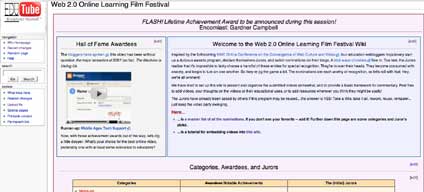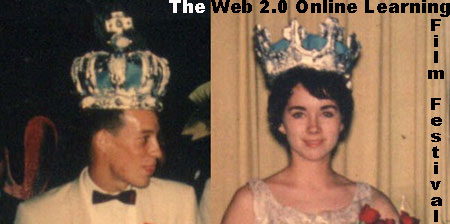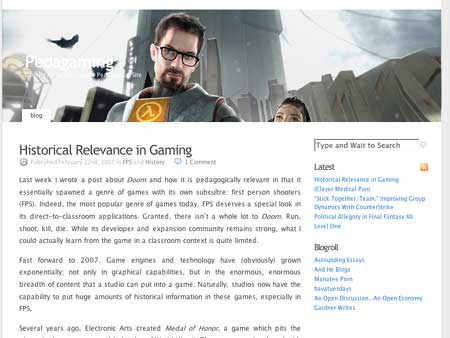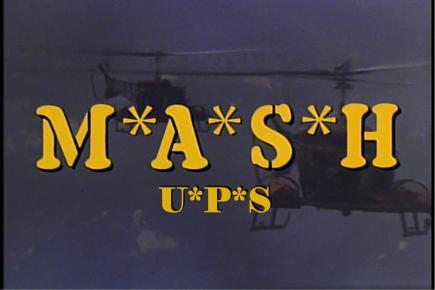The blogosphere I inhabit has been quite active as of late with some really thoughtful examinations of the ways we understand such large and powerful ideas as the nature of the university, teaching and learning, technology, and our own sense of obligation and commitment. Here’s a tour of my own rummaging through these ideas, all of these thinkers offering me a nuanced conceptualization of a very complex series of inter-related issues –thank you one and all.
Brian Lamb’s doubts about his own path-breaking struggles to realize a vision of the connected university (in Brian’s case mashups and RSS) with a more sobering institutional reality started me thinking about some of the issues we are up against:
It seems like a painfully familiar dynamic, expecting that just ahead things will fall into place and something utterly revolutionary will be upon us. But can we assume that things will come together the way we envision? Perhaps our fate is eternally mucking through a messy and promising set of possibilities, with enough useful bits spinning out of the maw to keep us from giving up altogether. Small victories providing a few passionate educators with the means to make big things happen inside a few people’s heads.
I respect Brian’s writings and his vision immensely and just can’t help but think he is on to some big things both with his questions and with his own shaping of the “revolutionary†that he constantly under emphasizes. His work may in fact be key to bringing together these random, arbitrary pieces we all find on a daily basis into some kind of recognizable, coherent, and accessible framework, that is at the same time loose and extensible.
From Brian’s comment discussion I found my way to Jon Beasley-Murray’s Post-Hegemony, one of Jon’s posts about the evolving (no Social Darwinian notion of progress implied) institutional logic that is playing itself out in higher education. This post is interesting to me in the way it frames the larger conceptions of the changing mission of today’s universities. Jon discusses a book called The University in Ruins by Bill Readings and frames his argument as follows:
Readings argues that the operative principle of the University is now “excellence,” a concept that replaces the previous guiding concept of “culture,” which itself succeeded the Kantian vision of “reason.”
But the characteristic of the University of Excellence is that it lacks any concrete referent: “excellence has no concept to call its own” (24); “excellence is clearly a purely internal unit of value that effectively brackets all questions of reference or function” (27).
Whereas the University of Culture was tied to the nation state and to national culture as its object and the national subject as its product, the University of Excellence is contextless and its students merely “consumers” (53); the university’s goal is now that “of producing a subject who is no longer tied to the nation-state, who can readily move to meet the demands of the global market” (49).
Such a framework is quite useful for understanding the very obstacles Brian is struggling with in relationship to social networks and the different forms of collective collaboration they may offer. At the point when these networks become institutionalized, are they then, by extension, part and parcel of this mission critical -are they in the business of producing a consuming subject for the global market? For I think many of us have been interpreting these tools as an alternative to such a pragmatic logic.
Gardner’s series of posts on Steiner (here and here) are eloquent examinations of the transcendent experiences born of the student/teacher relationship. His framing of this bond as a generative, life-affirming force is a necessary reminder that as we move towards thinking through transforming education institutionally the human connections this structure can make possible must not be forsaken.
These posts by Gardner then lead me to Stephen Downes’s exacting post wherein he closely examines and re-writes a series of marketable slogans on what the future of education is and is not. This, in turn, leads me to re-visit his vision on the OL Daily homepage which further frames the problematics of the master/student relationship in higher education Gardner was working through:
I want and visualize and aspire toward a system of society and learning where each person is able to rise to his or her fullest potential without social or financial encumberance, where they may express themselves fully and without reservation through art, writing, athletics, invention, or even through their avocations or lifestyle.
Here is a vision of education one can imagine without necessarily dressing it up as an institution of masters in pursuit of “excellence.†More pointedly, Downes’s notion of moving away from the social and financial encumbrance of current educational enterprises is of no small concern. Throughout the states the price tag of an average education (no guarantee of transformative, mind you) seems to be climbing to ludicrous levels almost as fast as real estate. The $10,000 – $20,000 cost of most 4-year public institutions (including room & board, etc.) only seems less insane when compared to the $30,000-$50,000 a year nut of most private colleges and universities -note that those figures are for ONE YEAR!!!! Does this fail to shock and greatly distress any other financially struggling Americans with young children?
The biggest question for me is increasingly becoming- how do we reproduce a learning environment that is not dependent upon and so deeply rooted in the financial, social, and political vision of the constantly expanding and ever-voracious system of global capital? Gardner’s idea of the relationships that define learning experiences is integral to growth and intellectual development, yet how do we reproduce these connections without a corporate-like drive towards an institutional definition of “excellence” that is accompanied by financial burden and a re-entrenchment of social hierarchies?
Now, that is a Learning Management System I want to build –anyone want to help? I’m not so sure it will be so difficult once Brian finally figures out eduglu (hasn’t Stephen Downes already done this?)! We’re all closer than we think –and that is by no means simply about the tools themselves but rather the ideas they empower!






